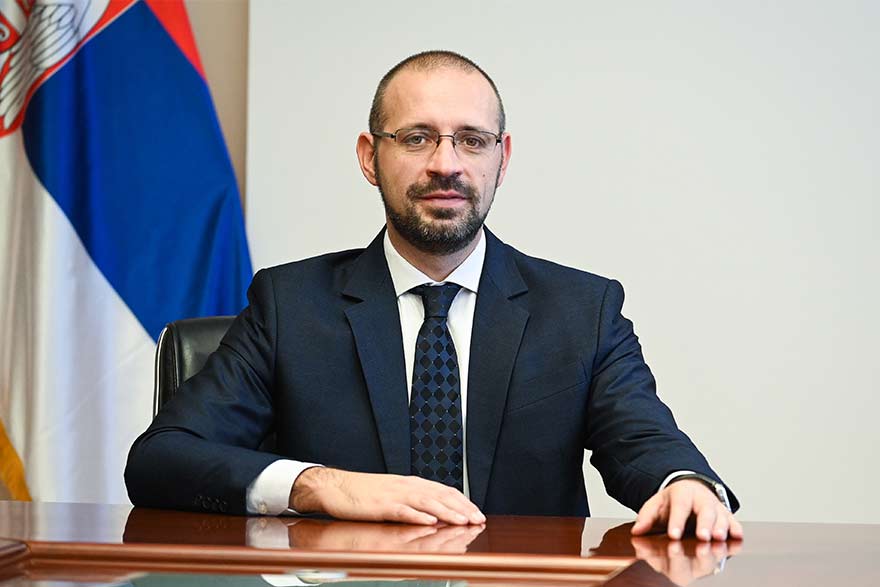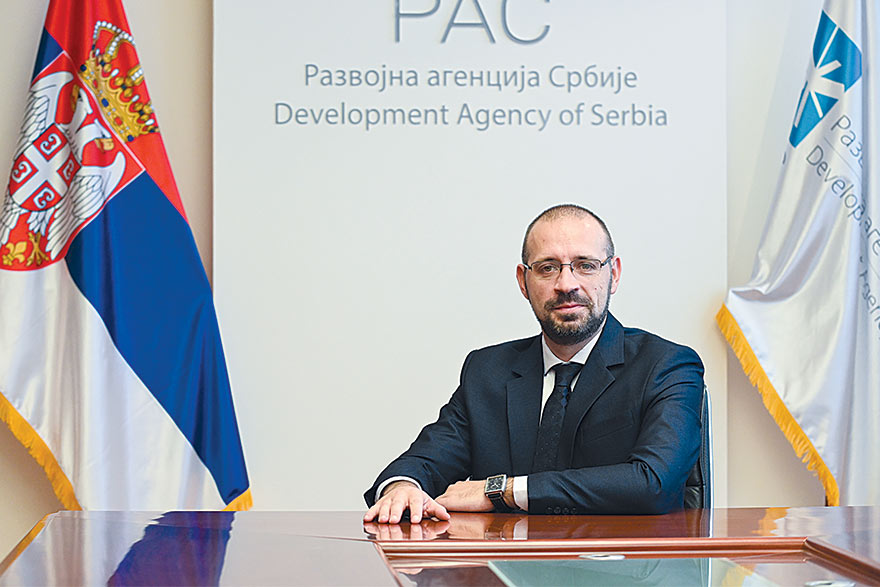The experiences of the Covid-19 pandemic could prompt major companies to opt for geographically closer suppliers and logistically simpler processes in the future. This is an opportunity for Serbia to attract new foreign investors, but also for domestic companies to become parts of large, global supply chains. Under the circumstances of the pandemic, there was almost no delay in constructing capacities for contracted investments, which reached record levels in 2019.
Developments on the economic front have undergone major shifts and changes at the global level during the Covid-19 pandemic. That uncertain period is a kind of challenge even now, and will probably remain so in the coming months for all companies, whether they are large corporations or small companies and entrepreneurs, in Serbia or any other country of the world. “As for Serbia specifically and the operations of companies here, a distinction could primarily be made between two types of companies, because the challenges or effects of the ‘Covid-19 situation’ differ depending on whether we are talking about small and medium-sized enterprises and entrepreneurs or multinationals and large companies operating in Serbia,” says Radoš Gazdić, director of the Development Agency of Serbia (RAS).
When it comes to the SME sector, RAS is in constant communication with enterprises, but in a survey conducted with representatives of this sector has also seen that some of the challenges include maintaining the level of operations that they had prior to the crisis, says our interlocutor. Some of them had to temporarily halt their work and production, and they also had fears about how they would maintain liquidity. However, they agree that the measures taken by the government proved to be an effective intervention without which it would not have been possible to return to regular business flows. The period ahead will certainly be challenging for this type of company, given that operations are still experiencing a slowdown and, as such, companies remain wary of new financial investments and exposure to risks. “Additional measures that the state plans to take as a form of support to additional employment will certainly contribute to increased operational security,” says Gazdić.
Large companies and multinational corporations had a situation globally, and also here, which saw the interruption or aggravated functioning of supply chains. And that will probably influence the future reorientation of these companies towards suppliers that are geographically closer and towards processes that are logistically simpler. “In such potential changes, we hope that companies from Serbia will join the supply chains of major world players – that they will take advantage of the opportunity that has imposed itself as a positive in this period,” says our interlocutor.

Speaking in general terms, most investment projects in Serbia didn’t experience major standstills during the “corona period”, whether that relates to building work on the construction of factories that didn’t stop at all, or existing production capacities that experienced minimal stoppages to production, while some of them commendably redirected production during those moments to protective masks and essential sanitary materials. “When the state of emergency was lifted, and in some cases even directly before that, most factories returned to normal in terms of production. Leading in this were manufacturers from the processing industry, the automobile industry and, of course, the food industry, which did not experience standstills but rather worked to greater capacities.
I also believe there won’t be a shortage of new investment projects, that their number will not lag behind the number we had in the previous period,” says the RAS director.
According to the reports of the Financial Times’ specialised FDI Intelligence service, Serbia has been at the top of the world over the last few years in terms of the number of foreign direct investments, based on the size of its economy. According to the statistics of Eurostat, with a GDP growth rate of five per cent in the first quarter of this year, Serbia took first place among 38 European economies.
“We are proud of these statistics because they say that we’ve attracted a larger volume of greenfield investments than can be expected from an economy and a country of this size,” says Gazdić. And this trend continued in 2019. “We had a total of 3,825 billion euros of foreign direct investment, which is the largest inflow of FDI in our country to date,” says Gazdić.
Which of the Government’s measures from last year and this one would you single out in terms of advancing the business environment and the country’s attractiveness for investment?
There are many measures, especially when it comes to amendments to existing legal norms that were made in the previous period in order to improve business operations in Serbia, such as amendments to the Labour Law, the Law on Planning and Construction and the Law on Investment, which also relate directly and indirectly to the creation of an optimal environment for investors. In parallel with the increase in minimum earnings, the Government increased the non-taxable part of salaries and reduced contributions to prevent employers’ costs from increasing significantly, which is also significant for future investors. A set of laws and tax breaks were adopted at the end of last year that are envisaged for the creation of an even better business environment in our country.
Also of great importance are the measures taken by the Government of Serbia relating to the mitigating of the negative consequences of the Covid-19 pandemic. In a very short time frame, the government adopted three regulations with which it brought precision to the legal framework for the implementation of state aid measures from an economic package worth 608.3 billion dinars, or 5.1 billion euros, and then also very quickly began implementing those same measures.
Last year we had a total of 3,825 billion euros of foreign direct investment, which is the largest inflow of FDI in our country to date
This segment of the government’s proactive moves is very important for maintaining liquidity and sustainable business operations, primarily among domestic companies, especially those in the sector of small and medium-sized enterprises and entrepreneurs, which have been the hardest hit by this crisis period. The application of measures, such as the moratorium on loans, deferrals for payments of taxes and contributions, direct payments, deferrals of corporate income taxes and loans for liquidity, have been accepted very well by domestic companies and are extremely important for maintaining the stability of the domestic economy.
These measures are particularly important from the perspective of preserving jobs and creating new ones. Considering RAS’s work to date, could the number of jobs created to date by contracted investments be estimated?
Only investment projects launched since the founding of RAS in 2016 – and we are talking about slightly more than 100 investment projects – should directly create over 40,000 jobs, while indirectly, according to World Bank estimates, these projects have enabled the creation of four to five times as many jobs, if we take into account construction works, logistics jobs, suppliers and other segments involved in, and related to, investment projects. Likewise, upon realisation, the value of investments in these projects will reach in excess of 2.3 billion euros.
I say all this in order for us to form a clear picture of what the Government of the Republic of Serbia has succeeded in doing in a very short period of time, but also us – as the Development Agency of Serbia – in terms of attracting FDI. And the key to our success, compared to neighbouring states and the countries of the region, is primarily in the unequivocal and everyday commitment of the Government to creating a positive business environment and attracting direct investment through the reform of legislation and the regulating of business. This is a precondition that says to investors that we are an orderly, predictable and safe environment for doing business.
Our people at RAS have over 15 years of work on foreign investment projects behind them and are extremely well acquainted with the way investors think
What kind of approach does RAS take in attracting investments that enable the transfer of technology?
We recognise the significance of investments that enable transfers of technology and strive to attract precisely the kinds of companies whose core business is based on sophisticated technology. Some such companies are already present in our country, such as Brose, MTU and ZF.
We also encourage the transfer of the latest technologies because we have very good foundations for implementing such projects – and those are the professional and educated people that are essential for work in technologically significant companies. Our educational institutions train high-quality engineers, technicians and researchers, and institutes participate in this with their many years of experience in the domain of scientific research.
Does Serbia have a suitable workforce that’s aligned with the needs of foreign investors?
I don’t think we have any fears about having a suitable workforce, and that in the coming years we will have new generations who are sufficiently skilled and trained for that which is needed by investors and the market. Supporting this is the fact that it is becoming increasingly popular to study some of the engineering sciences in our country, as well as the fact that a large number of our young people attend technical high schools.

All this is a consequence of our de facto industrial tradition. We already have companies that cooperate with schools in terms of dual education – one successful example of that cooperation is the Secondary Technical School in Požega, which could, according to government announcements, become a regional training centre for CNC machines.
Which measures are available to RAS for encouraging domestic investment that remains below the appropriate level?
The regulations of the Republic of Serbia define, clearly and unambiguously, that all incentive measures apply equally to both domestic and foreign companies. According to the existing Law on Investments, there are equal opportunities, rights and obligations for both domestic and foreign investors when it comes to applying for incentives. It is true that domestic companies are often lagging behind in percentage terms compared to foreign investors when it comes to investments and subsidies, which is a consequence of their weaker investment power, but everyone has the opportunity to receive incentives under the same conditions.
The advantage of RAS is in the fact that we devote equal attention to supporting and developing the domestic economy through programmes and activities intended for the SME sector. By strengthening the capacities of domestic companies, through the improving of their operations and potential, on the one hand, and attracting direct investments, on the other, we strive to create a sustainable and successful system in which investors, both domestic and foreign, can rely on domestic suppliers and incorporate them into their flows, especially those that are orientated towards exports of the products and services of companies from Serbia.
To what extent is RAS equipped to lobby for Serbia in competition with the development agencies of other countries, in a professional and financial sense?
I consider that, as an Agency, we are sufficiently ready in every sense to be serious competition to countries and development agencies in other countries, and testifying to that are the results and successes of the last few years. The fact that we achieve much better results than any other country in the region in terms of direct investment, the fact that we have been declared the best investment destination several times, and the fact that we have the most investment in the Western Balkans (€3.8 billion in 2019), says enough about whether we are equipped and whether we are “beating” the competition in other countries.